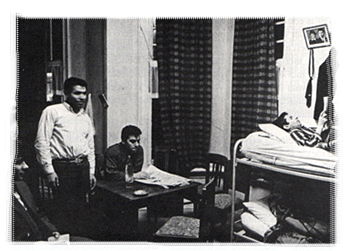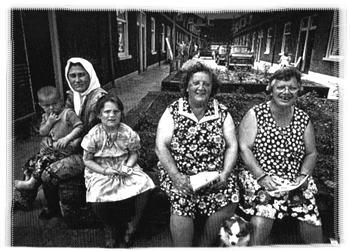
Dutch government and the immigrants
Over the years the immigration and integration policies of the Dutch government have changed considerably. Here follows a short summary.
1960s and '70s: no integration policy
The guest workers who arrived in the 1960s in the Netherlands, did not plan to stay very long. They wanted to make a lot of money in a short time and then return to their family in their country of origin. The Dutch government shared this perception and made no effort to integrate these people. Guest workers had to continue using their own language, to follow their own religion, and to keep their own traditions. This would make a return to their country of origin easier.

But many of them did not go back to their home countries and were joined by their families. Many of the 'guest workers' were clearly no longer 'guests' but had become permanent residents of the Netherlands. Despite the fact that these former guest workers started to settle down and form new ethnic minority communities, the government barely changed its immigrant policy. It hardly put any pressure on the immigrants to learn the Dutch language or to otherwise become more oriented towards Dutch society.
1980s: minority policy
By 1980 it became generally accepted that the Netherlands had become an immigration country. This led to the Dutch government's decision to introduce a so-called minority policy. The government realised that if the guest workers and their families wanted to stay in the country, they had to be given a place in society. The economic situation in the Netherlands was far from rosy at the time and many former guest workers, especially those with a Moroccan or Turkish background, had lost their jobs. These non-Western immigrants often had few qualifications and spoke little or no Dutch. The minority policy of the Dutch government, aimed to support and empower the different ethnic communities, tried to tackle the cultural and social deprivation of immigrants by organising free language education and vocational programmes.
1989 - 1998 : immigrant policy
The immigrant policy introduced by the government in 1989 was geared towards quicker and better integration of immigrants into Dutch society. A central issue in this new integration policy was education. Free, voluntary language courses were organised by every local community in the Netherlands. But because the government's policy was mainly aimed at people who had recently arrived in the country, little or nothing changed for the older generation, the so-called oldcomers.
1998 - 2006: Wet Inburgering Nieuwkomers (WIN)
In 1998 the Dutch government voted for a new law, Wet Inburgering Nieuwkomers (Newcomers' Integration Law). The primary aim of this integration policy was to increase the self-sufficiency of newcomers. Newcomers should be able to function independently in Dutch society as quickly as possible. Under this act all adult immigrants who have lived less than a year in the Netherlands are required to take part in an integration programme. The programme comprises training in the Dutch language, and social and vocational orientation. The WIN stipulates (mainly financial) sanctions for newcomers who fail to meet the obligations set out by the law.
Since 1st January 2007 the WIN has been replaced by the Wet Inburgering (Integration Law). Unlike the WIN, this act, which imposes the duty to integrate, is not only aimed at new arrivals but also at oldcomers, who have already lived in the country for a couple of years, but who have not completely integrated or participated in Dutch society, due to their insufficient knowledge of the Dutch language and society. All people who fall under this new act are required to pass an integration examination, which tests the participants' knowledge of the Dutch language and society. The Netherlands is currently the only country in the world to demand knowledge of language and society from its inhabitants (with a non-Western immigrant background) before allowing them to stay permanently.
>Click here to read about the common problems of immigrants.

